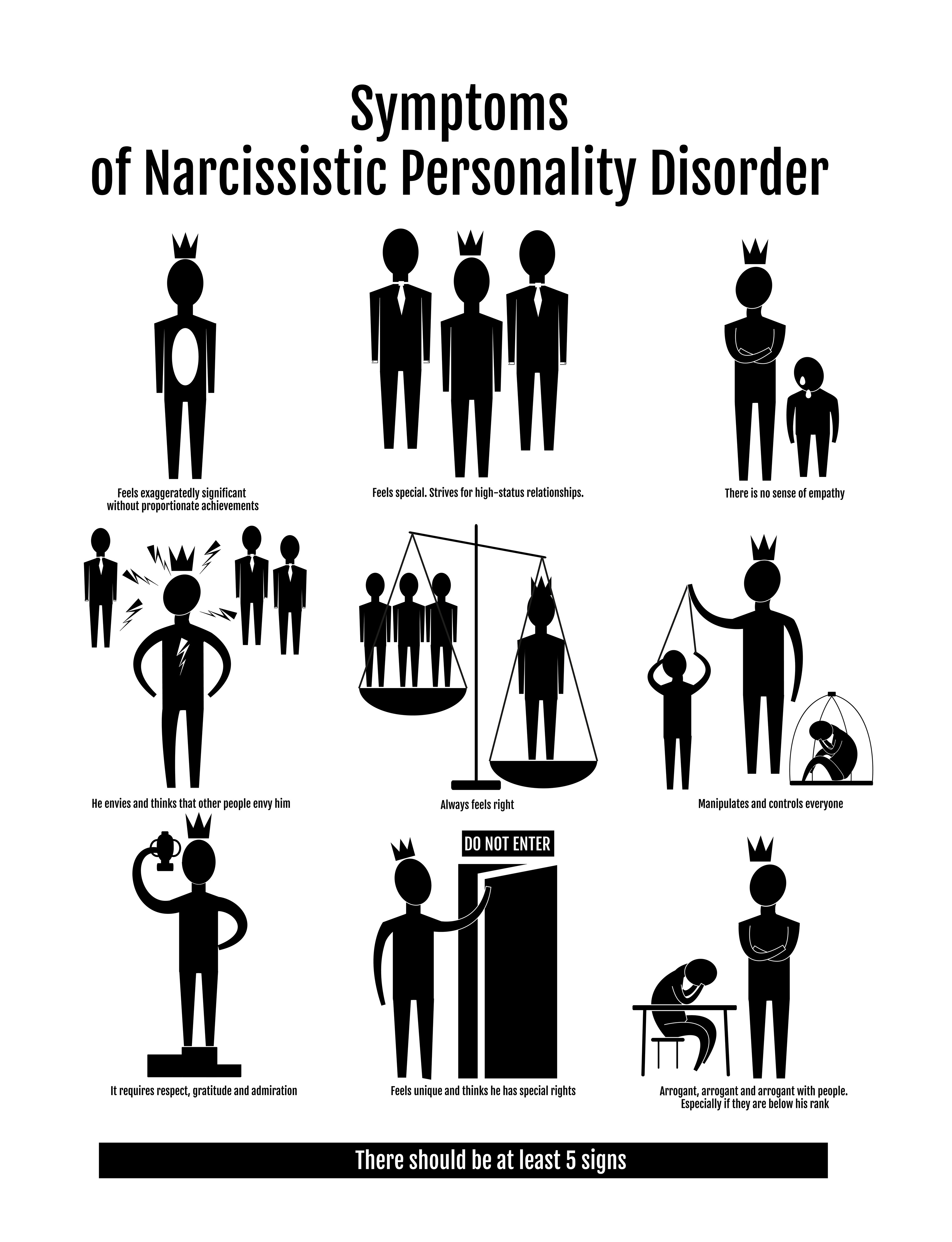As a BetterHelp affiliate, we receive compensation from BetterHelp if you purchase products or services through the links provided
Working with a narcissist can be tough and frustrating. Their behavior can negatively impact productivity, morale, and job satisfaction. It’s important to recognize their traits and behaviors and know how to address them to protect yourself and your coworkers effectively.
Narcissism is characterized by a grandiose sense of self-importance, a thirst for admiration, and the tendency to manipulate and exploit others. In a workplace setting, narcissists often take credit for the work of others, engage in bullying, and prioritize their interests above the organization’s success. Many employees struggle to identify and navigate this behavior. Still, with the right strategies, you can expose a narcissist in your workplace to curtail the negative impact on your career and the work environment.
Key Takeaways
- Learn to recognize the signs of narcissism in the workplace
- Understand the potential impacts of narcissistic behavior on the work environment
- Develop strategies for exposing a narcissist in the workplace and seeking appropriate support
 Understanding Narcissism
Understanding Narcissism
Traits of a Narcissist
Narcissism is often characterized by an exaggerated sense of self-importance, an inflated sense of self, and a lack of empathy for others. As a result, narcissists tend to display certain traits and behaviors that can disrupt and negatively affect their workplace relationships. Some common narcissistic traits include:
- A constant need for attention and admiration
- A sense of entitlement
- Exploiting others for personal gain
- Manipulating and controlling behavior
- Arrogance and self-centeredness
Recognizing these traits in a coworker or boss can help you identify the presence of narcissism and appropriately deal with a narcissist in your workplace.
Narcissistic Personality Disorder versus Self-Confidence
While narcissism and self-confidence may appear similar, it’s important to distinguish between them, as they have different implications for workplace behavior and relationships. Narcissistic Personality Disorder (NPD) is a distinct mental health condition characterized by a consistent pattern of narcissistic behaviors. In contrast, self-confidence is a positive quality that fosters healthy self-esteem and assertiveness.
Here are some key differences between NPD and self-confidence:
- NPD often leads to manipulative or exploitative behaviors, while self-confidence promotes genuine collaboration and cooperation.
- Self-confidence is associated with a healthy sense of self-worth, while an inflated sense of self-importance characterizes NPD.
- People with NPD can struggle with empathy and understanding others’ perspectives, whereas those with self-confidence are typically more empathetic and supportive.
By understanding the nuances between narcissism and self-confidence, you can more accurately identify the presence of a narcissistic boss or coworker and be better equipped to address the challenges of working alongside someone with narcissistic tendencies.
Spotting a Narcissist in the Workplace
 Signs and Warning Signs
Signs and Warning Signs
Pay attention to certain signs and warning signs to identify a narcissist in your workplace. Narcissists often exhibit an inflated sense of self-worth, excessive need for admiration, and disregard for others’ feelings. They may have difficulty accepting failure, argue over rules, and belittle those who outperform them. Be mindful of colleagues who display these traits, as they may be narcissistic.
Manipulative Behaviors
Narcissists tend to use manipulative behaviors in the workplace. Some common tactics include gaslighting, where they make you doubt your perceptions and experiences, and playing the victim to gain sympathy and control. They might also exploit your vulnerabilities to advance their interests. Recognize these manipulative strategies and maintain healthy boundaries with your colleagues to protect yourself.
Narcissist Leaders and Coworkers
Leadership positions like managers and CEOs can sometimes attract narcissistic individuals. These leaders might exhibit high self-importance, expect constant admiration, and manipulate subordinates. If you work with a narcissistic boss or coworker, consider how to manage your interactions and protect your well-being. Remember to maintain open lines of communication with trusted colleagues or human resources for support.
 Impacts of Narcissism on Career and Workplace
Impacts of Narcissism on Career and Workplace
Abuse and Bullying
Having a narcissistic boss or coworker in the workplace can cause great harm. They often abuse and bully colleagues to elevate their status and feed their inflated egos. This behavior can create a toxic environment, impacting mental health and overall well-being.
Impact on Performance and Professional Relationships
A narcissistic coworker or boss can negatively impact your performance, as they may take credit for your work or be overly critical of your efforts. Additionally, their lack of empathy and manipulative tactics can damage professional relationships, impeding collaboration between teams and individuals.
Consequences and Dangers
Narcissistic individuals in the workplace might bring about dangerous consequences. Their ambition can lead to rash decision-making and unethical actions, such as managerial fraud or aggressive tax avoidance. This behavior could lead to lasting damage for the company and result in legal trouble or financial scandals. Recognizing and addressing these issues promptly is essential to protect yourself and your organization.
How to Expose a Narcissist in the Workplace
Gathering Documented Evidence
To expose a narcissist in the workplace, begin by collecting documented evidence. This can include emails, texts, reports, or other documents demonstrating the narcissist’s behavior. Keep records of interactions, such as instances of manipulation or them taking credit for your work. Be discreet while gathering this information and keep it organized. You can also confide in trustworthy colleagues with similar experiences to offer additional evidence against the narcissist.
Reporting to HR and Leadership
Once you have gathered substantial evidence, report your concerns to HR and leadership in the company. Present your documentation clearly and organized, showing the narcissist’s harmful behavior pattern. Be prepared to explain how these actions negatively impact your work environment and productivity. It’s important not to ignore these issues, as the narcissist’s behavior is likely affecting more than just yourself. Keep HR informed and remind them of the importance of addressing this situation.
Dealing with Reactions and Fallout
After exposing a narcissist, prepare to deal with reactions and fallout. Narcissists may retaliate or manipulate to save their reputation, so remain vigilant in maintaining your evidence. Remain confident in your decision, as exposing their behavior is crucial to improving the work environment for everyone. Be aware that some colleagues may have differing opinions or be skeptical – remain professional and focus on the facts of the situation. Lastly, practice self-care and ensure you care for yourself during this process. Dealing with a narcissist can be emotionally draining, so it’s important to prioritize your well-being.
Seeking Help and Support
 Involving Family, Friends, and Therapists
Involving Family, Friends, and Therapists
When dealing with a narcissist in the workplace, seeking help and support from your close network is essential. Reach out to family and friends who have your best interests at heart. They can provide moral support, help you cope with the situation, and offer practical suggestions based on their experiences.
In addition to your close network, consider seeking the guidance of a therapist. A mental health professional can provide valuable insights and coping strategies to deal with the narcissist’s behavior. They can also help you build emotional resilience and strengthen your communication skills to navigate the challenging work environment.
Legal Steps and Involving Attorneys
If the narcissist’s behavior at work becomes intolerable or escalates to harassment or abuse, you might need to take legal steps to protect yourself. First, make sure to document any incidents involving the narcissist. Keep a clear record of:
- Communication between you and the narcissist
- Instances of harassment or mistreatment
- Attempts to address the behavior with management or HR (if applicable)
These records can serve as vital evidence if you decide to pursue legal action.
When necessary, involve an attorney specializing in workplace law to help you navigate the legal process. They can provide expert advice on whether to pursue a case against the narcissist or your employer and inform you of your rights in the workplace. Remember, your priority should be maintaining a safe and respectful work environment.
Navigating the Ego Minefield: Strategies for Dealing with Narcissists at Work
Dealing with a narcissist at work can be a draining and challenging experience. However, by employing some thoughtful strategies, you can make the situation more manageable:
- Set Clear Boundaries: Determine what you’re willing to tolerate and communicate those boundaries assertively but respectfully.
- Avoid Power Struggles: Narcissists often thrive on conflict and control. Avoid getting sucked into power struggles by remaining calm and professional.
- Utilize Neutral Communication: Use neutral language that focuses on facts. Avoid emotional responses that may fuel further confrontation.
- Seek Support When Needed: If the behavior becomes disruptive or harmful, don’t hesitate to seek support from a supervisor, HR, or a trusted colleague.
- Protect Your Well-being: Implement self-care practices to maintain mental and emotional well-being. Engaging in activities you enjoy outside of work can provide a valuable counterbalance to stress.
- Understand Their Behavior: Recognizing that narcissistic behavior is often rooted in insecurity and a need for validation can help you approach the situation with more empathy and less frustration.
- Consider Professional Mediation: If the situation becomes unbearable, professional mediation or conflict resolution might be worth considering. Sometimes an objective third party can make headway where internal efforts have failed.
Applying these strategies, you can navigate the tricky terrain of working with a narcissist while preserving your professional integrity and personal well-being.
Frequently Asked Questions
What are the signs of a narcissistic coworker?
A narcissistic coworker may display behaviors such as constantly seeking attention and admiration from others, acting like they are the center of the universe, and ignoring the opinions and needs of their colleagues. They might also be extremely competitive and take personal credit for the work of the team or individuals.
How can you handle a narcissistic boss effectively?
Handling a narcissistic boss can be challenging, but some strategies include gaining clarity and agreement on expectations, writing down goals and sharing them with stakeholders, and establishing and maintaining strong, healthy boundaries. Remember to stay professional and avoid getting drawn into their emotional games.
What steps can you take to reveal a covert narcissist in the workplace?
Uncovering a covert narcissist at work involves recognizing the traits of narcissistic personalities. Pay close attention to behavior patterns, such as manipulation, excessive self-focus, or a lack of empathy. By observing these traits, you can identify individuals who may be covert narcissists and make informed decisions about how to handle them.
How can you outsmart and deal with a narcissist at work?
To outsmart and deal with a narcissistic coworker, avoid falling into their attention-seeking traps, and maintain clear boundaries. Know your strengths and value, and avoid getting drawn into their emotional manipulations. Having a strong support network of colleagues who can provide objective input when dealing with a narcissist is also helpful.
What actions can be taken to protect yourself from narcissistic colleagues?
Protecting yourself from narcissistic colleagues may involve setting boundaries, documenting problematic behavior or performance instances, and seeking help from supervisors or HR when the situation warrants it. Keep communication clear and objective, and avoid gossiping or negative conversations about the narcissistic individual.
How do narcissistic bosses impact office morale and productivity?
Narcissistic bosses can hurt office morale and productivity as they prioritize their needs and desires over their employees. This may result in employees feeling undervalued or manipulated, lowering job satisfaction and productivity. Companies need to address issues related to narcissistic bosses and promote healthy working environments for all employees.
Meet Jacob Maslow: Navigating Mental Health and Legal Challenges with Resilience
I’m Jacob Maslow, a seasoned mental health advocate, and a therapy veteran. I write these articles about mental health and narcissism, drawing from my own life experiences. My daily battles with mental health are managed with the aid of Lexapro, and I find solace in long walks to clear my head.
I’ve been through a protracted and tumultuous court battle with my ex, who suffers from severe narcissism. She has consistently broken court orders and alienated our children, refusing to cooperate with shared custody. Despite court orders, I’ve been denied any communication with my two minor kids. This has been an ongoing struggle for years, a struggle made all the more painful because of the close relationship I previously enjoyed with my children.
However, I’ve channeled my pain and frustration into helping others. Through my writing, I hope to assist those dealing with narcissistic partners and mental health challenges, affirming that anyone can overcome their mental health issues. In addition, I run a legal site designed to support others who face a non-cooperative spouse, helping them navigate the complex and often heartbreaking legal maze of custody and court orders.
- Breaking the Silence: Why Men’s Mental Health Matters More Than Ever - April 15, 2025
- How to Transform a Home’s Patio Space into a Relaxing Space - March 23, 2025
- 5 Strategies to Use a Cell Phone to Help Manage Your Stress - March 23, 2025
This site contains affiliate links to products. We will receive a commission for purchases made through these links.


 Understanding Narcissism
Understanding Narcissism Signs and Warning Signs
Signs and Warning Signs Impacts of Narcissism on Career and Workplace
Impacts of Narcissism on Career and Workplace Involving Family, Friends, and Therapists
Involving Family, Friends, and Therapists
